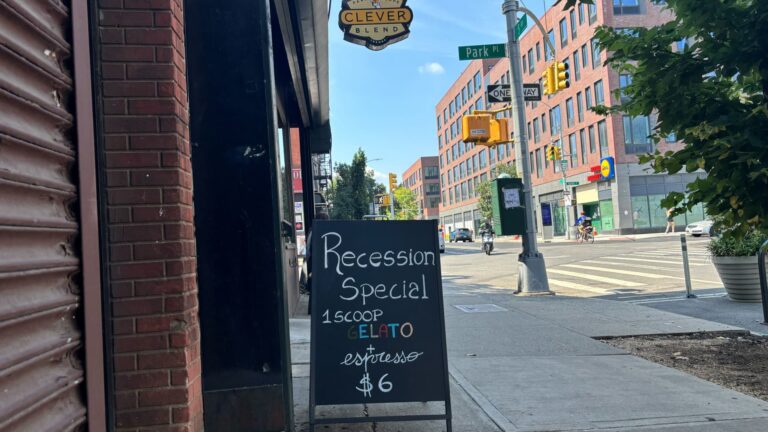A sign outside Brooklyn coffee shop Clever Blend offers a $6 gelato and espresso “recession special.”
Lisa Kailai Han | CNBC
As fears of a slowing economy lurk in the background, some businesses are taking notice and bringing back so-called recession specials.
Look up the term “recession specials” through Google’s search engine, and the list of results will include entries from the Great Recession nearly 20 years ago.
Consider this Grub Street article from 2008 slugged “Recession Specials: Your Definitive Guide.” Or this 2009 story from The New York Times, which details the mealtime recession specials restaurants across New York offered as an act of survival.
Fast-forward to 2025 and a crop of establishments are once more hinting at a looming economic downturn.
When ‘recession’ returns as a selling point
Recession fears were heating up this spring as President Donald Trump rolled out a slate of tariffs in early April. The term “recession indicator” entered the vernacular of social media users as a tongue-in-cheek way of gauging a potential economic slowdown.
Businesses are now getting in on the joke as well. For instance, Brooklyn, New York coffee shop Clever Blend advertises a $6 gelato and espresso “recession special.”
Wicked Willy’s, a bar in Manhattan, got on board by offering a “Recession Pop Party” earlier this month, with one caption on an Instagram post declaring: “The recession is BACK! Get ready to dance and party all night long!”
Market Hotel, a Brooklyn concert venue, advertised a similar event. “From The Fame to Animal, Circus to Rated R, we’re serving economic anxiety with a side of electro-pop, bloghaus, and auto-tuned glam,” an Instagram caption for the event read. “Dress like rent’s due and you’re dancing through it.”
But the trend doesn’t just stop in New York. Super Duper, a burger chain with 18 locations across the San Francisco Bay Area, tapped in earlier this year with its own “Recession Burger,” a seasonal special introduced in the summer.
“THE ONE THING THAT DIDN’T GET THE INFLATION MEMO: Meet the Recession Combo, our new Seasonal Special,” a post from Super Duper’s Instagram reads. The meal includes a “Recession Burger,” fries and a beverage for $10.
An Instagram post from Super Duper Burgers advertises its summer “Recession Combo” special.
Courtesy: Super Duper Burgers via Instagram
The idea for the burger’s name didn’t necessarily come from a desire to cash in on the buzzword, said Ed Onas, Super Duper’s vice president of operations. Instead, he said, the moniker was derived from the Depression-era origins of the Oklahoma-style smash burger, which aimed to stretch ground beef by adding lots of sliced onions.
But once Super Duper established the burger’s name, the chain decided to offer a discounted “Recession Combo” for $10. This would save customers $5 from the normal price of the add-ons, Onas said.
“That’s kind of where the name of the burger plays in … And we figured, we’re calling it the ‘Recession Combo,’ why don’t we just offer a deal that makes it a really good value for our guests?” Onas told CNBC in an interview. “Inflation has kind of been going on, and we figured it’s a nice offer for a short amount of time for our guests.”
This extra-value combo meal was an exception for Super Duper, which normally doesn’t offer such deals. The burger went viral in a local San Francisco subreddit, with a post gaining 1,400 upvotes and 170 comments.
“Obviously, we were happy about it. We didn’t realize that it was going to get as much attention as it did,” Onas said. “We were happy, and our guests were happy, and at the end of the day, that’s what it’s all about.”
As a testament to the burger’s overwhelming success, Onas told CNBC that Super Duper will be adding it onto its menu as a permanent fixture going forward.
Shedding light on waning consumer sentiment
These small businesses getting in on the trend could be a broader reaction to waning consumer confidence. Consider that the University of Michigan’s consumer sentiment index came in at 58.6 in August, down from a reading of 61.7 in July and reflecting a 13.7% change on a year-over-year basis.
This souring in sentiment has been driven primarily by concerns over trade policy, said Joanne Hsu, director of the surveys of consumers at the University of Michigan.
“What’s very clear from the consumer sentiment data is that consumers are broadly bracing for a slowdown in the economy and a deterioration — not just with inflation, expecting inflation to get worse — but they’re also expecting businesses conditions to deteriorate,” she said. “They’re expecting labor markets to weaken and unemployment rates to go up. And what you’re seeing with these businesses could be a reaction to that.”
A lack of consumer confidence — and trust in income reliability — will ultimately lead to a pullback in spending, Hsu added.
“Young people are feeling just as bad about the economy as older folks, and in some months they feel even worse than older folks,” she said. “Across the age distribution, people agree that the trajectory of the economy has soured.”

